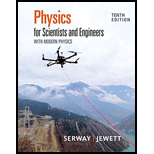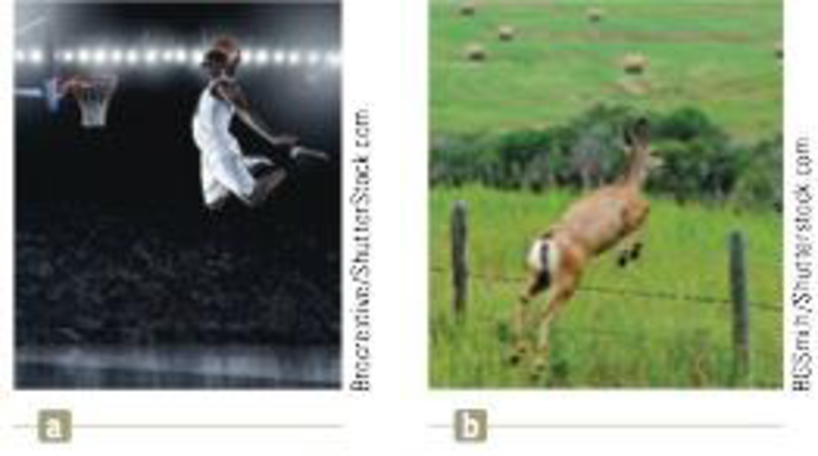
Concept explainers
A basketball star covers 2.80 m horizontally in a jump to dunk the ball (Fig. P4.12a). His motion through space can be modeled precisely as that of a particle at his center of mass, which we will define in Chapter 9. His center of mass is at elevation 1.02 m when he leaves the floor. It reaches a maximum height of 1.85 m above the floor and is at elevation 0.900 m when he touches down again. Determine (a) his time of flight (his “hang time”), (b) his horizontal and (c) vertical velocity components at the instant of takeoff, and (d) his takeoff angle. (e) For comparison, determine the hang time of a whitetail deer making a jump (Fig. P4.12b) with center of mass elevations yi = 1.20 m, ymax = 2.50 m, and yf = 0.700 m.
Figure P4.12

(a)
The time of flight of the basketball star.
Answer to Problem 12P
The time of flight of the basketball star is
Explanation of Solution
Section 1:
To determine: The initial velocity of basketball star to go up.
Answer: The initial velocity of basketball star to go up is
Given information:
The horizontal distance covered by the basket ball star is
From the instant the star leaves the floor until just before he lands, the basketball star is a projectile.
The equation to calculate the upward motion of his flight is,
Substitute
Section 2:
To determine: The final velocity of basketball star to go up.
Answer: The initial velocity of basketball star to go up is
Given information:
The horizontal distance covered by the basket ball star is
Substitute
Section 3:
To determine: The time of flight of the basketball star.
Answer: The time of flight of the basketball star is
Given information:
The horizontal distance covered by the basketball star is
The equation to calculate the hang time of basketball star is,
Substitute
Conclusion:
Therefore, the time of flight of the basketball star is
(b)
The horizontal velocity component of the basketball star at take off.
Answer to Problem 12P
The horizontal velocity component of the basketball star at take off is
Explanation of Solution
Given information:
The horizontal distance covered by the basket ball star is
The formula to calculate horizontal velocity component of the basketball star is,
Substitute
Conclusion:
Therefore, the horizontal velocity component of the basketball star at take off is
(c)
The vertical velocity component of the basketball star at takeoff.
Answer to Problem 12P
The vertical velocity component of the basketball star at takeoff is
Explanation of Solution
Given information:
The horizontal distance covered by the basketball star is
From the section 1 of part (a), the vertical component of the velocity of the basketball star at takeoff is,
Conclusion:
Therefore, the vertical velocity of the basketball star at takeoff is
(d)
The takeoff angle.
Answer to Problem 12P
The takeoff angle is
Explanation of Solution
Given information:
The horizontal distance covered by the basket ball star is
The formula to calculate take off angle is,
Substitute
Conclusion:
Therefore, the takeoff angle is
(e)
The time of flight of the deer.
Answer to Problem 12P
The time of flight of the deer is
Explanation of Solution
Section 1:
To determine: The upward velocity of deer going up.
Answer: The upward velocity of deer going up is
Given information:
The horizontal distance covered by the basketball star is
Substitute
Section 2:
To determine: The upward velocity of deer going down.
Answer: The downward velocity of deer going down is
Given information:
The horizontal distance covered by the basketball star is
Substitute
Section 3:
To determine: The time of flight of the deer.
Answer: The time of flight of the deer is
Given information:
The horizontal distance covered by the basketball star is
The equation to calculate the hang time of deer is,
Substitute
Conclusion:
Therefore, the time of flight of deer is
Want to see more full solutions like this?
Chapter 4 Solutions
Physics for Scientists and Engineers with Modern Physics
- If a projectile is fired from the origin of the coordinate system with an initial velocity υ0 and in a direction making an angle α with the horizontal, calculate the time required for the projectile to cross a line passing through the origin and making an angle β < α with the horizontal.arrow_forwardDuring a baseball game, a baseball is struck, at ground level, by a batter. The ball leaves the baseball bat with an initial speed v0=25.7m/s at an angle θ=20.5∘ above the horizontal. Let the origin of the Cartesian coordinate system be the ball's position the instant it leaves the bat. Ignore air resistance throughout this problem. A) Express the magnitude of the ball’s initial horizontal velocity component, v0,x0,, in terms of v00 and θ. B) Express the magnitude of the ball’s initial vertical velocity component, v0,y0,, in terms of v00 and θ. C) Find the ball’s maximum vertical height, hmax in meters, above the ground. D) Enter an expression in terms of v0, θ, and g for the time it takes the ball to travel to its maximum vertical height. E) Calculate the horizontal distance, xmax, in meters, that the ball has traveled when it returns to ground level.arrow_forwardA cannon is fired from the ground level, in a flat terrain, making an angle of 30° upwards with the horizontal. A bullet exits the barrel with a scalar speed of 980 m/s. If resistance can be neglected, what is the horizontal distance traveled by the bullet before it hits the ground? a) 43 km b) 4,3 km c) 8,5 km d) 85 km e) 170 kmarrow_forward
- A firework is launched with an initial velocity of 25 m/s at an angle of 60 degrees with respect to the horizontal. a. The horizontal component of the firework’s velocity, just before it reaches the peak of its motion (where it will explode)?b. The vertical component of the firework’s velocity, at a time 0.4 seconds after it was launched.c. The magnitude and direction of the acceleration of the firework, at a time 0.4 seconds after it was launched.arrow_forwardCan you help me with this question? A motocyclist drives his bike off of a 12 m high horizontal ledge. If he is driving at a speed of 22 m/s horizontally, how far from the base of the ledge does he land?arrow_forwardAt a latitude of Φ=33°, at an altitude of 30000 km above the Earth's center, what is the acceleration vector of an object that completes 4 revolutions per day?arrow_forward
- When a ball with a mass of 3 kg reaches 9 meters above the ground after being thrown obliquely from the ground to the air, the velocity vector is calculated with v = 7i + 6j. Accordingly, what is the maximum height the ball can reach?arrow_forwardAn airplane has been directed to fly in a clockwise circle, as seen from above, at constant speed until another plane has landed. When the plane is going north, is it accelerating? If so, in what direction does the acceleration vector point? If not, why not?arrow_forwardA diver runs horizontally off the end of a diving board with an initial speed of 1.50 m/s. If the diving board is 3.50 m above the water, what is the diver's speed just before she enters the water?arrow_forward
- A projectile is fired at 75 degrees above the horizontal line with an initial velocity v0. At which of the following angles the projectile will land at the same distance as it is landed when fired at 75 degrees? A. 15 degrees B. 25 degrees C. 35 degrees D. 45 degreesarrow_forwardA skateboarder, with an initial speed of 2.2 m/s, rolls virtually friction-free down a straight incline of length 18 m in 3.3s. - At what angle θ is the incline oriented above the horizontal?arrow_forwardA marble is launched from the edge of a table at a angle of 45 ° up from horizontal and goes through the air until it hits the floor. True or False? For such a marble, |vx| (the magnitude of the x-component of the velocity) is decreasing the entire time the marble is airborne.arrow_forward
 Classical Dynamics of Particles and SystemsPhysicsISBN:9780534408961Author:Stephen T. Thornton, Jerry B. MarionPublisher:Cengage Learning
Classical Dynamics of Particles and SystemsPhysicsISBN:9780534408961Author:Stephen T. Thornton, Jerry B. MarionPublisher:Cengage Learning University Physics Volume 1PhysicsISBN:9781938168277Author:William Moebs, Samuel J. Ling, Jeff SannyPublisher:OpenStax - Rice University
University Physics Volume 1PhysicsISBN:9781938168277Author:William Moebs, Samuel J. Ling, Jeff SannyPublisher:OpenStax - Rice University

